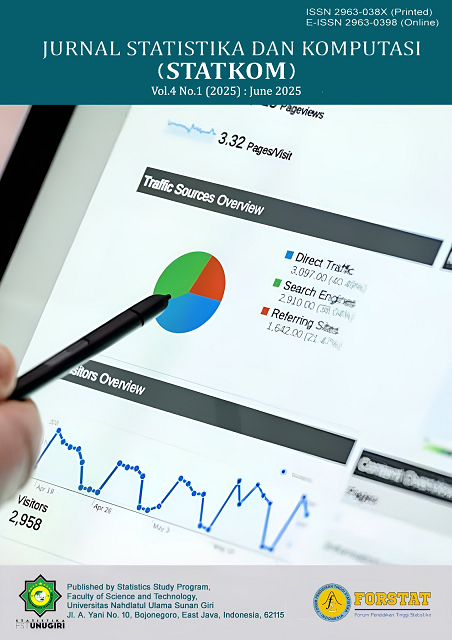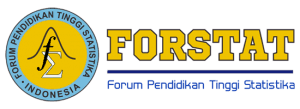Modeling the Satisfaction of Data Literacy Online Training for High School Teachers Using PLS SEM

DOI:
https://doi.org/10.32665/statkom.v4i1.4429Keywords:
Learner Satisfaction, Online Teacher Training, PLS-SEM, Data Literacy TrainingAbstract
Background: The gap between before and after the pandemic is incredibly noticeable, especially in education. It mainly changes how schools operate their teaching and learning activities from offline to online. Indonesia must also implement online learning. The basic needs for data literacy in administration are strongly needed, such as inputting data for students' attendance, scores, and many more. Teachers need to improve their data literacy skills to help them evaluate and design new content structures for online teaching to meet students' required satisfaction. Therefore, the teachers’ training program in data literacy always needs to be updated.
Objective: This study aims to determine the factors that influence teacher satisfaction in data literacy online training programs
Methods: This study employs partial least square structural equation modelling (PLS-SEM) to analyze the factors influencing teacher satisfaction in online data literacy training programs for high school teachers.
Results: The results show that the instructor's guidance, support, module content, and experience positively influence learner satisfaction in online data literacy training. The PLS-SEM can explain 62.53% of learner satisfaction
Conclusion: Online training providers can consider these variables their primary focus when providing high-quality online training, especially in data literacy. The instructor guidance and support include instructor expertise, the assistance provided, and many more, and the module content and experience include a suitable syllabus for the learner and the ease of use of the learning system.
References
Baber, H. (2020). Determinants of students’ perceived learning outcome and satisfaction in online learning during the pandemic of COVID19. Journal of Education and E-Learning Research, 7(3), 285–292. https://doi.org/10.20448/JOURNAL.509.2020.73.285.292
Bickle, M., Rucker, R., & Burnsed, K. A. (2019). Online Learning: Examination of Attributes That Promote Student Satisfaction. Online Journal of Distance Learning Administration, 22(1), 1–7. https://ojdla.com/archive/spring221/bickle_rucker_burnsed221.pdf
Chen, W. S., & Tat Yao, A. Y. (2016). An Empirical Evaluation of Critical Factors Influencing Learner Satisfaction in Blended Learning: A Pilot Study. Universal Journal of Educational Research, 4(7), 1667–1671. https://doi.org/10.13189/ujer.2016.040719
Fathurrohman. (2020). Kompetensi Guru pada Teknologi Masih Rendah. Fajar Indonesia. https://fin.co.id/2020/02/07/kompetensi-guru-pada- teknologi-masih-rendah/
Göltl, K., Ambros, R., Dolezal, D., & Motschnig, R. (2024). Pre-Service Teachers’ Perceptions of Their Digital Competencies and Ways to Acquire Those through Their Studies and Self-Organized Learning. Education Sciences, 14(9), 951. https://doi.org/10.3390/educsci14090951
Harahap, M., Pristiyono, P., Lubis, J., Ikhlash, M., & Anjar, A. (2021). Level of Satisfaction of Online Learning in Mediation Lecturer Competence on Learning Motivation. Budapest International Research and Critics Institute-Journal, 4(3), 3981–3990. https://www.bircu-journal.com/index.php/birci/article/view/2166
Henderson, J., & Corry, M. (2021). Data literacy training and use for educational professionals. Journal of Research in Innovative Teaching and Learning, 14(2), 232–244. https://doi.org/10.1108/JRIT-11-2019-0074
IMF. (2018). Chart of the Week: The Digital Divide in Asia. Blogs.Imf.Org. https://blogs.imf.org/2018/09/25/chart-of-the-week-the-digital-divide-in-asia-2/
Janah, M., & Kartini, A. Y. (2022). Penerapan Metode Regresi Linier Berganda Pada Kasus Balita Gizi Buruk Di Kabupaten Bojonegoro. Jurnal Statistika Dan Komputasi, 1(2), 74–82. https://doi.org/10.32665/statkom.v1i2.1170
Jaya, I. G. N. M., & Sumertajaya, I. M. (2008). Pemodelan Persamaan Structural dengan Partial Least Square. Semnas Matematika Dan Pendidikan Matematika 2008, 118–132.
Jogezai, N. A., & Baloch, F. A. (2023). Native, addict, innovator: young teachers’ digital competence in the post-COVID-19 instructional era. International Journal of Educational Management, 37(6–7), 1382–1400. https://doi.org/10.1108/IJEM-03-2023-0148
Kaur, C., Tan, P. P., Nurjannah, N., & Yuniasih, R. (2025). Exploring data literacy self-perception among Indonesian high school students. PLoS ONE, 20(1 January), 4–6. https://doi.org/10.1371/journal.pone.0312306
Li, N., Marsh, V., & Rienties, B. (2016). Modelling and Managing Learner Satisfaction: Use of Learner Feedback to Enhance Blended and Online Learning Experience. Decision Sciences Journal of Innovative Education, 14(2), 216–242. https://doi.org/10.1111/dsji.12096
Mandinach, E. B., & Gummer, E. S. (2016). Every teacher should succeed with data literacy. Phi Delta Kappan, 97(8), 43–46. https://doi.org/10.1177/0031721716647018
Pham, T., Lai, P., Nguyen, V., & Nguyen, H. (2021). Online learning amid Covid-19 pandemic: students’ experience and satisfaction. Journal Of E-Learning And Knowledge Society, 17(1), 39–48. https://doi.org/10.20368/1971-8829/1135293
Sarstedt, M., Ringle, C. M., & Hair, J. F. (2017). Partial Least Squares Structural Equation Modeling. In Practical Assessment, Research and Evaluation (pp. 1–34). Springer International Publishing AG 2017. https://doi.org/10.1007/978-3-319-05542-8_15-1
Downloads
Published
Issue
Section
License
Copyright (c) 2025 Marizsa Herlina, Nur Azizah Komara Rifai, Dwi Agustin Nurani Sirodj

This work is licensed under a Creative Commons Attribution-ShareAlike 4.0 International License.
Authors who publish with this journal agree to the following terms:
- Authors retain copyright and grant the journal right of first publication with the work simultaneously licensed under a Creative Commons Attribution License - Share Alike that allows others to share the work with an acknowledgment of the work's authorship and initial publication in this journal.
- Authors are able to enter into separate, additional contractual arrangements for the non-exclusive distribution of the journal's published version of the work (e.g., post it to an institutional repository or publish it in a book), with an acknowledgment of its initial publication in this journal.
- Authors are permitted and encouraged to post their work online (e.g., in institutional repositories or on their website) prior to and during the submission process, as it can lead to productive exchanges, as well as earlier and greater citation of published work.
USER RIGHTS
All articles published Open Access will be immediately and permanently free for everyone to read and download. We are continuously working with our author communities to select the best choice of license options, currently being defined for this journal as follows:
 PDF Download: 154
SIMILARITY INDEX Download: 0
PDF Download: 154
SIMILARITY INDEX Download: 0

















